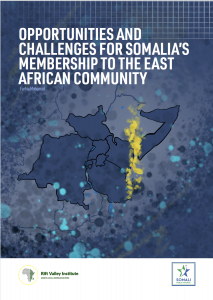EXECUTIVE SUMMARY
With Somalia’s official entry into the East African Community (EAC) on 24 November 2023, this paper intends to present and analyse the challenges and opportunities its integration might have. Thus, the study uses primary data collected from 20 government officials, members of think tanks and academia, and other professionals, supplemented by secondary data and information taken from media monitoring.
The paper establishes deep-rooted and pervasive challenges to Somalia’s membership of the EAC. Some emerge as a result of structural barriers: These include insecurity, the absence of political harmony in power and resource-sharing, weak governance systems, and a lack of physical infrastructure and the development of institutional capacity. Others include social and cultural differences between Somalis and other citizens of EAC member states, as well as different levels of skills and development.
The paper also indicates that there are, inevitably, opportunities linked to Somalia’s new membership of the EAC. These include allying with the region against insecurity, the standardization of laws and procedures, and enabling the country to adhere to international systems of finance, economy and technology. Integration will allow Somalis from the blue economy (Somalia lies on the Indian Ocean and Red Sea) to invest competitively in the EAC, bringing with it the possibility of opportunities for job creation.
The study recommends that the Somali government carefully consider addressing the challenges presented both here and elsewhere.
Acknowledgements
This report has been published as a result of Farhia’s training in the Rift Valley Institute’s (RVI) Research Communities of Practice (RCoP) project. The paper therefore reflects the views of the author and not those or the position of the Rift Valley Institute. The RCoP is one of the RVI’s flagship projects that supports the professional development of early career scholars in east and central Africa through training, mentorship and dissemination of research outputs. Building on RVI’s long-term experience and presence in the region, the RCoP is a value-driven project that is built around a community of practitioners and academics with a common interest in the professional development of early career researchers. With funding from the Carnegie Corporation in New York, USA, and in partnership with the Open Society University Network-Hub for Connected Learning Initiatives, the RVI trained 27 early career scholars from Somalia, Somaliland, Ethiopia, the Democratic Republic of Congo (DRC), South Sudan and Kakuma refugee camp in Kenya in the first and second phases of the RCoP project between August 2022 and January 2024.
This report was edited by Catherine Rosemary Bond.
The Author
Farhia Mohamud is a Researcher at Somali Public Agenda (SPA). She holds a Higher Diploma in Security Studies from the Higher Institute for Security Studies, and an Associate of Science in Economics from SIMAD University, Somalia. Farhia’s research interests are in regional integration, developmental economics, Somalia’s peace, security, and governance. She actively shares her insights as a blogger, working to change the narrative of Somalia through her thought-provoking blog posts.




